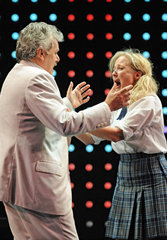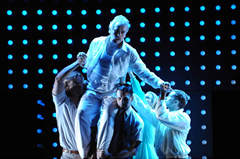| Opera Reviews | 20 April 2024 |
| Bliss
has the potential to go far by Sarah Noble |
|
| Dean: Bliss Opera Australia Sydney Opera House 12 March 2010 |
|
|
Bliss, Brett Dean's first opera, has been ten years in the making, and in that time, expectations have reached precarious levels, heightened by the opera's iconic literary provenance and the artistic team assembled to create it. Success has seemed certain. But assumptions are dangerous animals and thus the big question has been obliged to hover, unanswered, until opening night - would Bliss be a triumph? The answer, happily, is yes. Dean's score is as complex, charismatic and ultimately beautiful as Harry Joy himself. His orchestration is finely wrought, yet has massive cumulative power: a humming, sensual soundscape, into which even Dean's unconventional touches - electronic effects, jazz inflections - are woven without affectation. His vocal lines are sensitive but challenging, combining middle-voice lyricism with extremes of tessitura, agility and tone colour. Recitative, arioso and aria are clearly delineated within the opera's seamless flow, and Dean displays a particular gift for ensemble writing. Amanda Holden's elegant, singable libretto is a concise and fittingly nightmarish distillation of Peter Carey's sprawling saga. Having deftly selected the novel's key scenes, Holden strings them together at a pace which reflects Harry's own trajectory, cramming the first half with vivid visions of Hell, then allowing the final act to slow with his recovery. A few scenes suffer slightly from the streamlining process, but the overall result is tight and lucid. Neil Armfield's bold, surreal staging sets familiar behaviour against visually arresting unreality. Brian Thomson's set is a massive black cube, its walls studded with coloured light-bulbs which ingeniously depict everything from Harry's heart-rate monitor to the rainforest. Constant use is made of the revolve, characters moving both with and against it as they slide between naturalism and stylised movement (choreographed by Kate Champion). Eerily contrasting the earthly with the hellish, Armfield draws us irresistibly into the maelstrom of Harry's experience. A superlative Australian cast brings this urban Inferno to life, and
if opening night had the tentative feeling of a strong final rehearsal
rather than a perfectly polished début, this was hardly surprising, and
instantly forgiven. Bliss has a lot of growing to do and there's
little doubt that these already impressive performances will gain in depth
and abandonment. |
|
|
Kanen Breen is a standout as Johnny, Harry's colleague and Betty's lover, singing with silken tone and exemplary diction. David Corcoran is also outstanding as Harry's drug-dealing son, his persuasive characterisation underpinned by vibrant singing. Shane Lowrencev takes three tragicomic roles; his most striking singing comes as the shambling Nurse, an inmate of the asylum. Henry Choo is an odd choice for the Italian waiter, Aldo, but as Nigel Clunes his clean-cut tenor is at its best. As Alex, Harry's colleague, Barry Ryan is winningly pathetic, his limber baritone a good foil to Harry's gravity. Stephen Smith gleams as both a policeman and Betty's doctor, while Malcolm Ede makes a witty cameo as Harry's neighbour. But the heart of Bliss is of course Harry Joy himself, and Peter Coleman-Wright, for whom the role was always conceived, is magnificent. Incandescent in voice and person, he is a Harry more wonderful than weird, whose decent-blokeishness is defined by softness rather than swagger. His expressive range, his command of vocal extremes, and the sheer beauty of his voice - all these are showcased, and lovingly stretched, by Dean's writing. This Harry is no mere imitation of the novel's - he is a distinct creation of rare and moving brilliance. The chorus tackles Bliss with keen, energised musicianship, and the AOBO plays with strength and precision, sensitively realising Dean's prismatic orchestration. Amidst a sea of expectation, Elgar Howarth's calm, focused leadership is both reassuring and revelatory, opening up the score's richly coloured veins while maintaining its overarching movement. Dean's operatic début could scarcely have been placed in safer hands. There are still headier heights for Bliss to reach. Long gestation notwithstanding, it remains a newborn creation, and needs time to carve out its own life and place in the repertoire. Yet opening night was already a significant achievement, powerfully withstanding the pressures surrounding it, and as this season and others after it progress, it is sure to become stronger and more triumphant still. As thoroughly Australian as its conception may have been, there is a pliability and universality to Bliss which must surely bode well for its future. These are early days, but Bliss has the potential to go far. See it now, before it conquers the world. |
|
| Text ©
Sarah Noble Photos © Branco Gaica |

 Harry
Joy has it all, until a near-death experience changes everything. After
a heart attack, and brief clinical death, he awakes in hospital with eyes
newly opened to the rotten truths beneath his life's perfect façade -
and is convinced that he's arrived in Hell. So Harry leaves his family,
leaves the business, survives a stint in a mental asylum, and falls in
love; and gradually, in his fumbling, hallucinatory way, finds a road
through Hell, to a life of truth and simplicity - and bliss.
Harry
Joy has it all, until a near-death experience changes everything. After
a heart attack, and brief clinical death, he awakes in hospital with eyes
newly opened to the rotten truths beneath his life's perfect façade -
and is convinced that he's arrived in Hell. So Harry leaves his family,
leaves the business, survives a stint in a mental asylum, and falls in
love; and gradually, in his fumbling, hallucinatory way, finds a road
through Hell, to a life of truth and simplicity - and bliss.  Merlyn
Quaife is strident and serpentine as Harry's manipulative wife, Betty,
making light work of Dean's angular writing, while Lorina Gore brings
agility and sweet, bright voice to Honey B, the child of nature and amateur
tart with whom Harry finds true love. Taryn Fiebig is excellent as Lucy,
his daughter, singing with youthful clarity. Milijana Nikolic visually
spectacular Mrs Dalton suffers, however, from blurry diction. Teresa La
Rocca and Jane Parkin are a sassy pair of nurses.
Merlyn
Quaife is strident and serpentine as Harry's manipulative wife, Betty,
making light work of Dean's angular writing, while Lorina Gore brings
agility and sweet, bright voice to Honey B, the child of nature and amateur
tart with whom Harry finds true love. Taryn Fiebig is excellent as Lucy,
his daughter, singing with youthful clarity. Milijana Nikolic visually
spectacular Mrs Dalton suffers, however, from blurry diction. Teresa La
Rocca and Jane Parkin are a sassy pair of nurses. 





